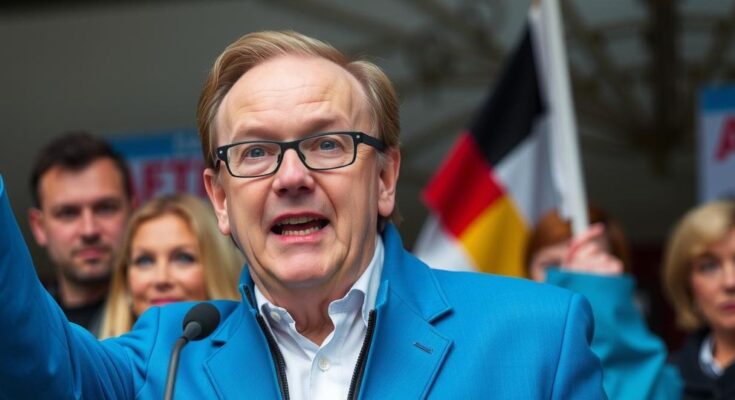The far-right AfD, led by Alice Weidel, is poised to gain significant traction in Germany’s upcoming general election, presenting radical policies on immigration and economic issues that appeal to a growing base. Recent events, protests, and interactions with influential figures spotlight the party’s controversial but compelling rhetoric. The election outcome may redefine Germany’s political landscape.
The Alternative for Germany (AfD), a rapidly ascending far-right political party founded in 2013, is currently polling as a strong contender for the upcoming general election in February. The party’s candidate for chancellor, Alice Weidel, aims to appeal to voters through her extreme stances, advocating for stringent immigration policies, a withdrawal from the euro, and the reinstatement of nuclear energy in Germany. With the AfD gaining increased support, critical questions arise regarding the potential for their ascent in German politics and the wider implications for the nation’s future governance.
In recent developments, the AfD has emerged as a significant force within the German political landscape, garnering considerable attention ahead of the elections. The party’s assertive stance on immigration and economic policy, along with its controversial views, has resonated with growing segments of the electorate. Public events, such as protests against the AfD’s congress, highlight the contentious environment surrounding their campaign, while the political discourse continues to polarize. Influential figures, including Elon Musk, have also interacted with the party leadership, further spotlighting the AfD on international platforms.
The specter of a strengthened AfD raises critical discussions on the state of democratic values in Europe, with analysts and foreign policy experts expressing concern over the normalization of far-right ideologies and the potential for societal division. As Alice Weidel’s candidacy progresses, her ability to connect with voters remains a focal point that could pivotally influence the outcomes of the forthcoming election.
The Alternative for Germany (AfD) party has maneuvered itself into a place of prominence since its inception, challenging traditional political norms. It capitalizes on the discontent surrounding immigration policies and the European Union, echoing sentiments from a segment of the population seeking radical change. The upcoming general election in February serves as a crucial juncture for the AfD, as it attempts to consolidate its voter base and expand its political influence amidst a polarized atmosphere.
In conclusion, the upcoming general election represents a critical moment for the AfD and its candidate Alice Weidel, who is advocating for contentious policies that challenge the status quo in Germany. As the party continues to gain traction among voters, the implications of their success could reshape the political landscape of the nation significantly. Observers will be watching closely to see if Weidel’s extreme positions resonate with the electorate and ultimately bolster the AfD’s authority in German politics.
Original Source: www.aljazeera.com




